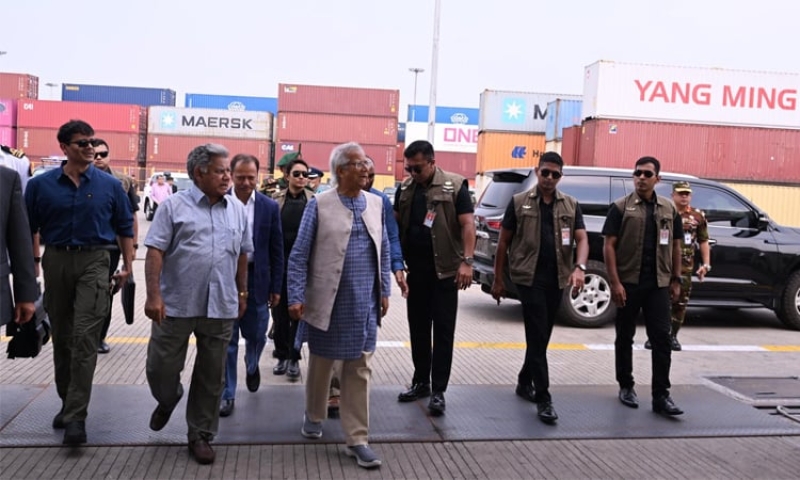- Puppet show enchants Children as Boi Mela comes alive on day 2 |
- DSCC Admin Salam’s drive to make South Dhaka a ‘clean city’ |
- 274 Taliban Dead, 55 Pakistan Troops Killed |
- Now 'open war' with Afghanistan after latest strikes |
- Dhaka's air quality fourth worst in world on Friday morning |
World-Class Firms to Operate Ctg Port: Chief Adviser

Chief Adviser Professor Muhammad Yunus announced today that the interim government is taking decisive steps to transform Chattogram Port into a world-class maritime hub by engaging leading international port management firms.
Speaking at the New Mooring Container Terminal during a day-long visit to the port, Prof. Yunus emphasized the strategic importance of Chattogram Port to Bangladesh’s economic future.
"This will be a tremendous opportunity for us," said the Chief Adviser. "If we want to transform Bangladesh’s economy, Chattogram Port is key. Without it, there’s no alternative."
Describing the port as "the heart of Bangladesh’s economy," he warned, "If the heart is weak, no physician can make it function properly. That’s why we must make it world-class."
Prof. Yunus said earlier efforts to bring in top international port operators had failed to gain traction, but the new initiative marks a serious commitment to global standards.
He also highlighted the port’s potential to become a regional trade gateway, connecting landlocked regions like Nepal and India’s northeastern states—known as the Seven Sisters.
“If these areas are connected to Chattogram Port, everyone benefits. Those who aren’t connected will fall behind,” he said.
Recalling his personal connection to the port, Prof. Yunus said, “Chattogram Port isn’t new to me. I’ve known it since childhood. While it has changed over time, the progress has been slow. That’s why from day one, I’ve pushed for change.”
He added, “The world has moved forward, but we’ve fallen behind. Many don’t pay attention to this, but we must act now.”
Calling for global expertise in managing port operations, the Chief Adviser said, “I hope everyone will see the reality and support this initiative.”
Shipping Adviser Brigadier General (Retd.) Shakwat Hossain praised Prof. Yunus for his proactive approach and said new terminals being built around the port will help reduce container congestion.
"I believe you will begin to see positive changes within the next six months," he added.
Rear Admiral SM Moniruzzaman, Chairman of the Chittagong Port Authority (CPA), noted that the port currently handles 92 percent of Bangladesh’s foreign trade, with 98 percent of that managed through the New Mooring Container Terminal.
However, he pointed out a major limitation: "At present, ships longer than 200 meters cannot anchor at the port, causing significant economic losses."

